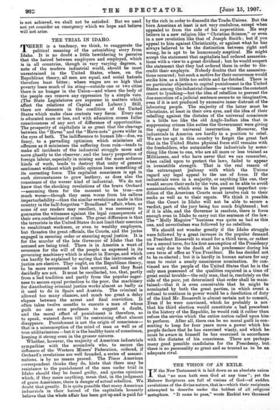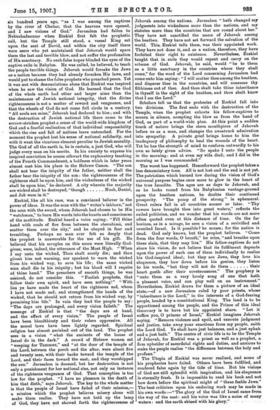THE VISION OF AN EXILE.
IN the New Testament it is laid down as an absolute axiom that "no man bath seen God at any time"; yet the Hebrew Scriptures are full of visions of God—of sudden revelations of the divine nature, that is—which their recipients attempted to describe under the boldest of all .religioun metaphors. "It came to pass," wrote Ezekiel two thouitand
six hundred years ago, "as I was among the captives by the river of Chebar, that the heavens were opened, and I saw visions of God." Jerusalem had fallen to Nebuchadnezzar when Ezekiel aid felt the prophetic call, but the Temple still stood, a vassal King sat upon the seat of David. and within the city itself there were seers who yet maintained that Jehovah would spare them the last and terrible blow, and not suffer the profanation of His sanctuary. No each false hopes blinded the eyes of the captive exile in Babylon. He was called, be believed, to teach the people terrible things. Jehovah would forsake the Jews as a nation because they had already forsaken His laws, and would put to shame the false prophets who preached peace. Yet It was not with denunciations alone that Ezekiel was inspired when he saw the vision of God. He learned that the God of the whole earth had other and larger aims than the maintenance of Jewish national integrity, that the divine righteousness is not a matter of reward and vengeance, and that the wheels of God do not come full circle in a century. "All souls are mine," Jehovah had declared to him ; and with the destruction of Jewish national life there came to the sorrow-stricken prophet a sense of the world-wide kingdom of God and a fearful realisation of that individual responsibility Which the rise and fall of nations leave untouched. For the moment the prophet lost his sense of national solidarity, and with it went the vicarious element peculiar to Jewish morality. The God of all the earth is, be is certain, a just God, who will judge every man on his merits. In his anxiety to express his inspired conviction he comes athwart the explanatory teaching of the Fourth Commandment, a boldness which in later years almost cost him hie place in the Hebrew Canon. "The son shall not bear the iniquity of the father, neither shall the father bear the iniquity of the son : the righteousness of the righteous shall be upon him, and the wickedness of the wicked shall be upon him," he declared. A city wherein the majority are wicked shall be destroyed, "though Noah, Daniel, and Job were in it."
Ezekiel, like all his race, was a convinced believer in the power of ideas. It was the man with the " writer's inkhorn," not the man with the sword, whom Jehovah had chosen to be His "watchman," to burn His words into the hearts and consciences of the multitude. Ezekiel beard a voice saying : "Fill thine hand with coals of fire from between the cherubim, and scatter them over the city," and he obeyed in fear and trembling. Perhaps no man ever felt so deeply that the .prophet is answerable for the use of his gift. He believed that his scruples on this score were literally God- given; were, indeed, the utterance of the Most High. "When I say unto the wicked, Thou shalt surely die; and thou givest him not warning, nor speakest to warn the wicked from his wicked way, to save his life ; the same wicked man shall die in his iniquity ; but his blood will I require at thine band." The preachers of smooth things, he was aeinired, do not consider this. "Foolish prophets, that follow their own spirit, and have seen nothing!" "With lies ye have made the heart of the righteous sad, whom I have not made sad; and strengthened the bands of the wicked, that he should not return from his wicked way, by promising him life." In vain they lead the people to say : "The days are prolonged, and every vision faileth." The message of Ezekiel is that "the days are at hand, and the effect of every vision." The people of Israel have been bloodthirsty and their rulers oppressive. All the moral laws have been lightly regarded. Spiritual religion has almost perished out of the land. The prophet sees in a vision "what the ancients of the house of Israel do in the dark." A crowd of Hebrew women sat "weeping for Tammuz," and "at the door of the temple of the Lord, between the porch and the altar, were about five and twenty men, with their backs toward the temple of the Lord, and their faces toward the east; and they worshipped the sun." Jerusalem is doomed, but her destruction is not only a punishment for her national sins, not only an instance of the righteous vengeance of God. That conception is too low for the prophet. "I have no pleasure in the death of him that dieth," says Jehovah. The key to the whole matter is that the people of Israel have failed of their mission,— a mission which the prophet believes misery alone will make them realise. They have not held up the lamp of 'God, they have not showed forth the righteousness of
Jehovah among the nations. Jerusalem "bath changed my judgments into wickedness more than the nations, and say statutes more than the countries that are round about her." They have not sanctified the name of Jehovah among the heathen. They have not set forward the salvation of the world. This, Ezekiel tells them, was their appointed work. They have not done it, and as a nation, therefore, they have forfeited their right to existence. Nevertheless, Ezekiel taught that in. exile they would repent and carry on the scheme of God. Jehovah, he said, would "be to them as a little sanctuary in the countries where they shall come," for the word of the Lord concerning Jerusalem had come unto him saying : "I will scatter thee among the heathen, and disperse thee in the countries, and will consume thy filthiness out of thee. And thou shalt take thine inheritance in thyself in the sight of the heathen, and thou shalt know that! am the Lord."
Scholars tell us that the prohecies of Ezekiel fall into two divisions. The first ends with the destruction of the Temple, when the prophet exhorts his fellow-captives to mourn in silence, accepting the blow as from the hand of God, as part of a world-wide plan. At this point a sudden touch of nature brings the stern mouthpiece of Jehovah before us as a man, and changes the awestruck admiration into sympathy. A private grief brings home to him the inadequacy of philosophy to heal the wounds of the heart. Yet he has the strength of mind to conform outwardly to his own so lately given advice. "So ipake I unto the people in the morning : and at even my wife died; and I did in the morning as I was commanded."
The worst has happened. Henceforward the prophet takes a leas denunciatory tone. All is not lost and the end is not yet. The patriotism which burned low during the vision of God's universal purpose begins once more to glow in the heart of the true Israelite. The ages are as days to Jehovah, and as be looks round from his Babylonian vantage-ground upon the heathen nations, he doubts their continued prosperity. "The pomp of the strong" is ephemeral. Great rulers fail in all countries sooner or later. "Thy rowers have brought thee into great waters," reflects the exiled politician, and we wonder that his words are not more often quoted even at this distance of time. On the far horizon, as in a mirage, he sees a vision of a revivified and reunited Israel. Is it possible ? he muses; for the nation is dead. God only knows, but the prophet believes. "Come from the four words, 0 breath," he cries, "and breathe upon these slain, that they may live." His fellow-captives do not share his vision, do not believe that its fulfilment depends upon the power of each one of them individually to realise his God-inspired ideal; but they are Jews, they love his eloquence, they bow down before his genius, they listen to his words, "but they will not do them their heart goeth after their coveteousness." The prophecy is "unto them as a very lovely song of one that bath a pleasant voice, and can play well on an instrument." Nevertheless, Ezekiel draws for them a picture of an ideal state,—of a new Jerusalem ruled by poor priests, whose "inheritance is the Lord," in the interests of a God-fearing people, headed by a constitutional King. The land is to be apportioned among the people, and the Prince of this ideal theocracy is to have but his appointed share. "Let it suffice you, 0 princes of Israel," Ezekiel imagines Jehovah saying. "Remove violence and spoil, and execute judgment and justice, take away your exactions from my people, saith the Lord God. Ye shall have just balances, and a just ephah and a just bath." The centre of civic life is to be the Temple of Jehovah, for Ezekiel was a priest as well as a prophet, a firm upholder of sacerdotal rights and duties, and anxious to make the people realise "the difference between the holy and profane."
The Utopia of Ezekiel was never realised, and some of his prophecies have failed. Others have been fulfilled, and rendered false again by the tide of time. But his visions of God are still splendid with inspiration, and his eloquence is eternally fresh. It is impossible to read his book and not bow down before the spiritual might of "these feeble Jews." The best criticism upon his enduring work may be made in his own words :—" The glory of the God of Israel came from the way of the east: and his voice was like a noise of many waters and the earth shined with his glory."







































 Previous page
Previous page